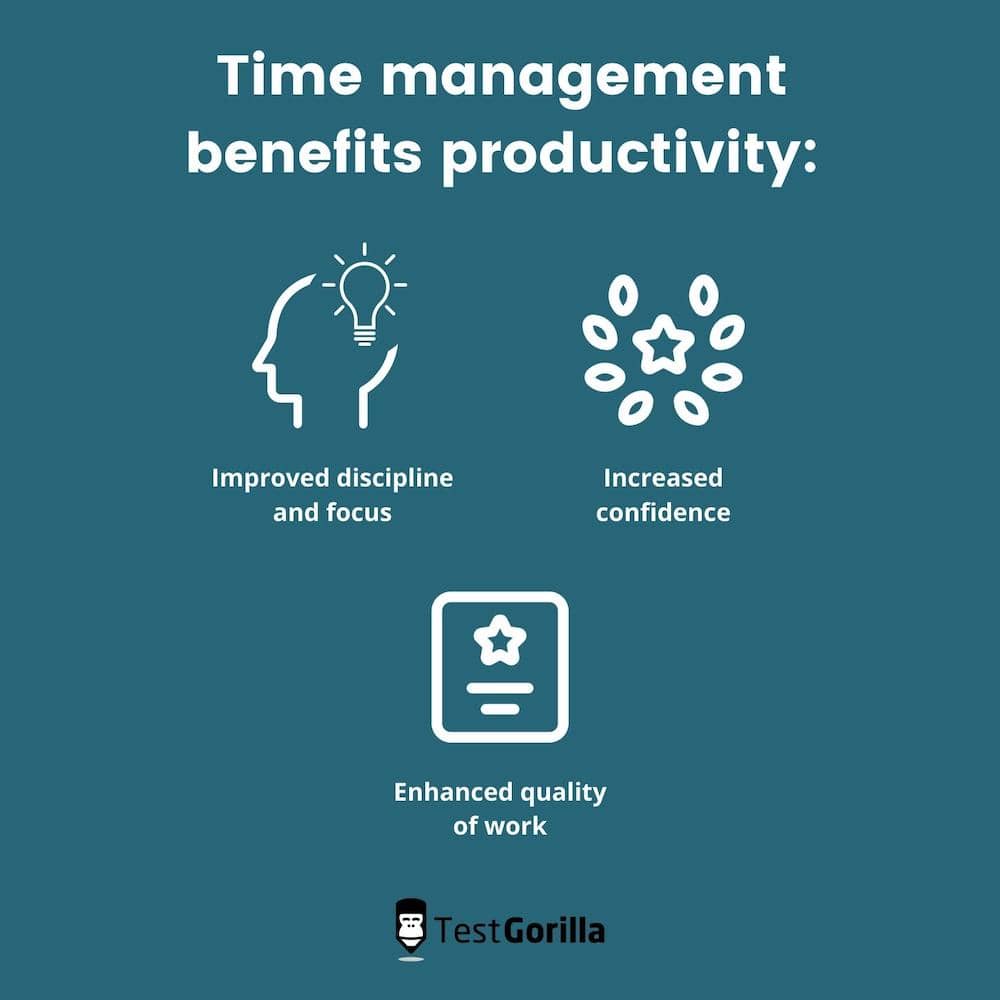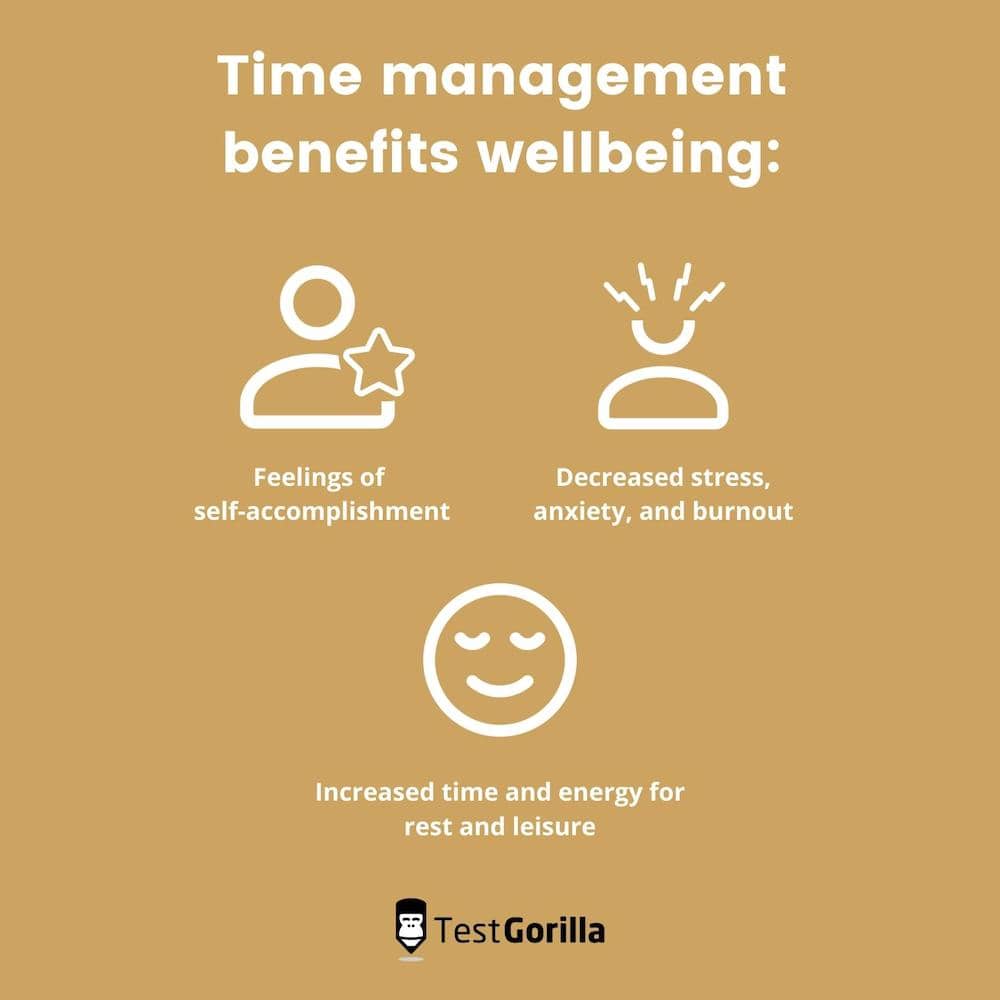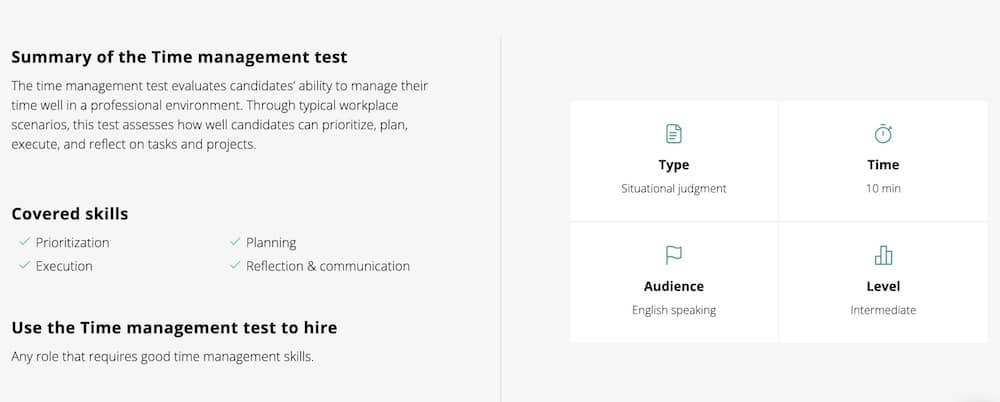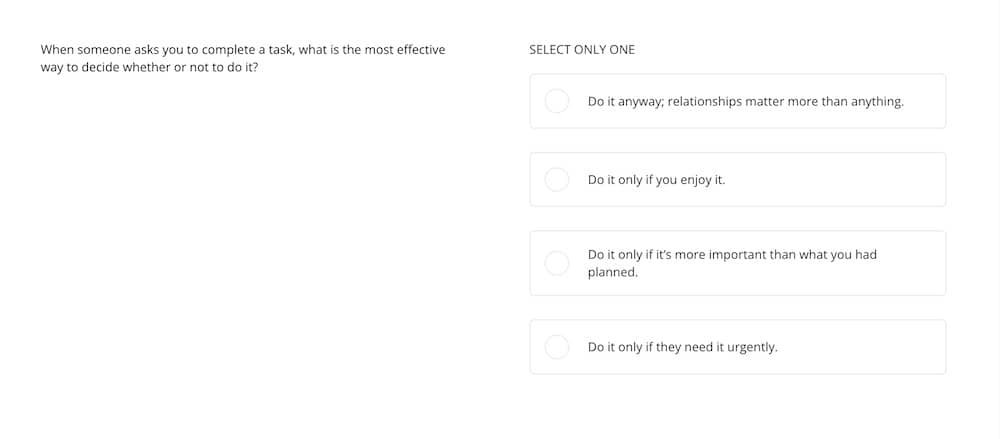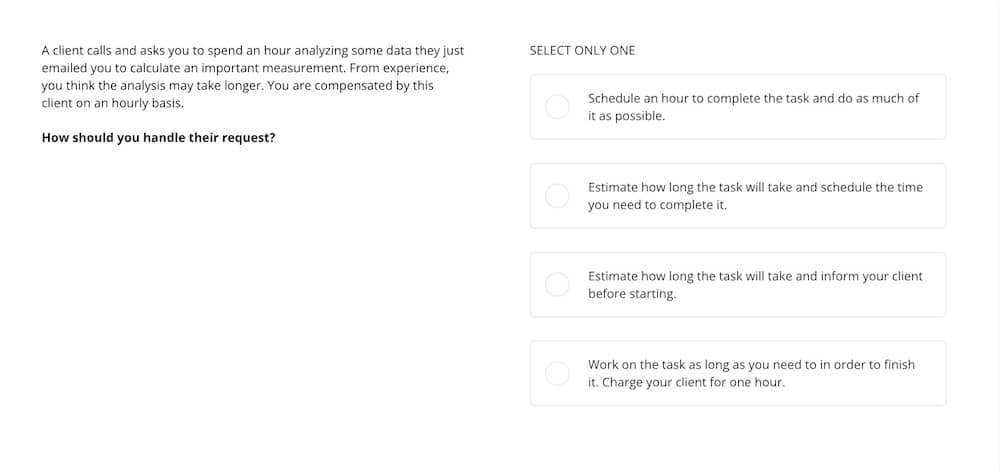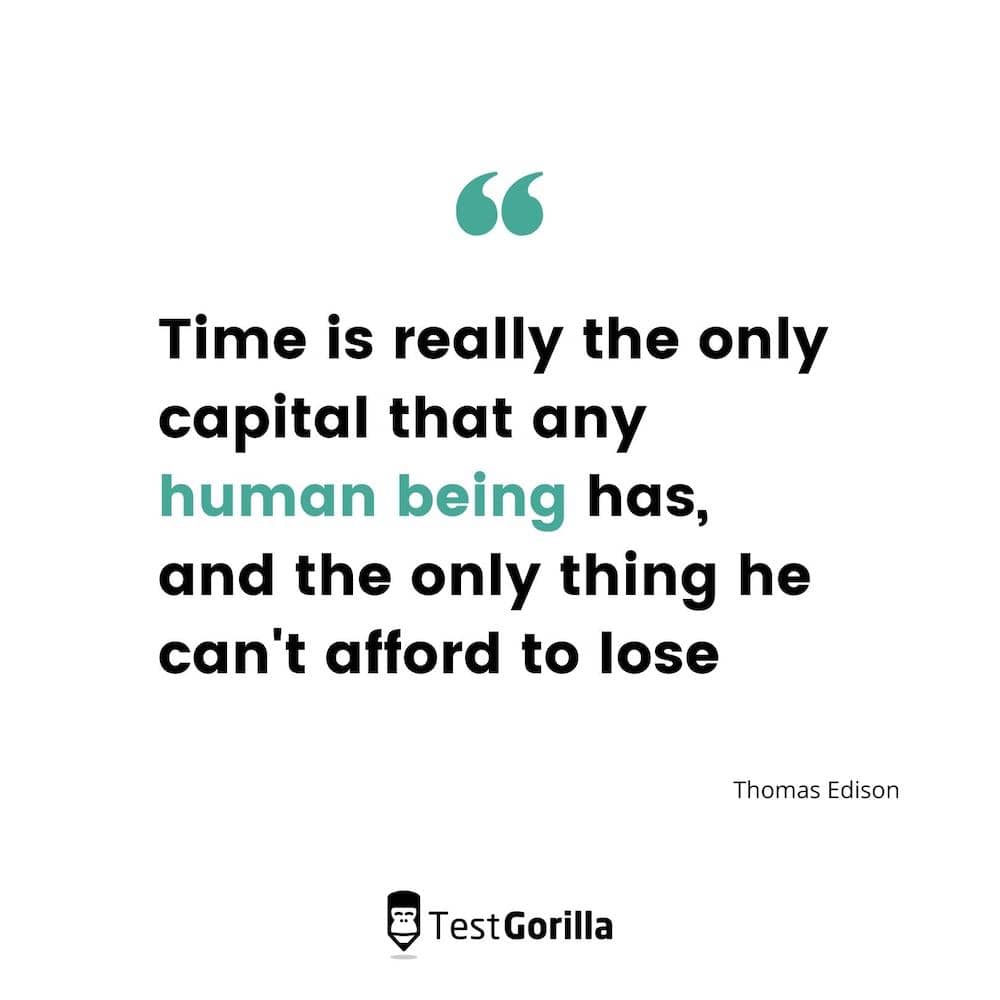Did you know that 89% of people waste time at work, with the top 10% percentile wasting upwards of 3 hours in the average working day?
Whatever industry you’re recruiting for, time management is a valuable skill to look for amongst candidates. Time-wasting is rife, and this isn’t simply because people are lazy. Each day that we face is riddled with possible distractions, with most of them being hosted online.
Though the world can feel rigged against it, everyone is capable of effective time management. Some are more prone to effective organization than others, but, like with any skill, those that are best at managing their time have usually worked hard to be that way.
In this article, we’ll outline a failsafe strategy that you and your hiring team can use to ensure you recruit candidates with excellent time-management skills
Table of contents
Why is time management important?
The short answer is that time is valuable (just because it’s a cliché, doesn’t mean it’s not true). To maintain or develop absolutely anything, be it a skill, a hobby, a relationship, you need to invest time into it. It is universally precious and important.
This being said, we tend to forget that time is a finite resource, just like money. As a society, we value money more than time, and people are generally less sensitive to losses of time than losses of money. Whilst most people have strategies in place to save money, only around 18% of people have a time-management system.
The longer answer is that feeling like you have more time, and like your work is under control, is extremely beneficial for both your wellbeing and your productivity.
Productivity benefits
Studies show that the link between time management and job performance seems to have grown stronger over the years. This makes sense since today we see an increasing amount of autonomous and flexible jobs that require people to manage their time well.
As a result, time-management skills are commonly advertised as a must-have for job roles. But how does time management actually impact performance at work?
People who manage their time well can expect to see the following results in the workplace:
Improved discipline and focus. When employees consistently manage their time well, habits form and discipline and routines begin to develop. Deep focus is more accessible to people who know how to plan and get on with their work, and these things form the basis of any productive working day.
Increased confidence. Employees who plan and execute tasks on time develop confidence in themselves to consistently do so, and thus the cycle continues. Forcing yourself into time-management strategies can be painful at first, but once it feels natural it’s a real confidence booster to know that you can trust yourself to get your head down.
Enhanced quality of work. Planning tasks and prioritizing them appropriately helps employees bring their full attention and focus to the things where quality matters most. If you are not distracted, or stressed about other things you need to or should be doing, then it makes sense that you’ll be producing work to the best standard you’re capable of.
Well-being benefits
Effective time management impacts well-being even more than productivity. In fact, the findings of an important study from 2021 reveal that managing your time well has a 72% stronger effect on life satisfaction than on job satisfaction.
This seems surprising since most discourse on time management highlights it as a vital skill for professional excellence and development. It is less surprising when we consider how important free time is for our well-being. If you manage your time well, you can dedicate more time to self-care, and to the things and people you love.
Crucially, learning a skill takes time, and if time management helps people make the time to learn a skill, then time management stands to dramatically enrich people’s lives
From ‘Does time management work? A meta-analysis’ (2021)
Finding and implementing a good time-management strategy can have the following positive effects on your well-being:
Feelings of self-accomplishment. Feeling a sense of accomplishment is important for well-being since it allows you to look at yourself with a sense of pride. Generally, it bolsters self-worth, though it’s worth taking a step back to think about what accomplishment means to you personally. If you manage your time well, you are more likely to accomplish your goals, work-related and otherwise.
Decreased chances of stress, anxiety, and burnout. This is largely related to productivity. If you are planning your time well and being more productive at work, tasks are far less likely to play on your mind once you leave the office or close your laptop. If you are setting and sticking to healthy boundaries when it comes to how much, or how late you work, then you are less likely to experience burnout.
Increased time and energy for rest and leisure. Like most things, well-being is about balance. Making sure work, play, and rest are in balance is key for improved well-being, and the only way to do this is by dedicating enough time to each. Understand that some weeks might require more work, rest, or play than others – good time management requires boundaries, but also flexibility when it’s necessary.
How will hiring for time management benefit my organization or business?
Although the benefits outlined above are largely personal, recruiting people who organize their time well is a worthwhile pursuit for organizations and businesses. As we can see above, there is more than enough evidence that points to time management as a harbinger of productivity, happiness, and fulfillment for people. And who doesn’t want happy and productive employees?
Studies show the happier we are, the harder we work
Research from the University of Warwick in 2021 found that happiness makes people around 12% more productive. So, people with good time-management skills are important to hire because they tend to be more productive and happier. This boosts productivity even more in itself.
Obviously, there is far more to happiness than good time management, and there are steps you as an employer can take to foster a working culture that is conducive to happiness. There are also things you can do to help existing employees manage their time better. But generally, it’s in your best interest to hire people who can manage their time to protect their well-being.
Employee burn-out is costly for employers
On the flip side, employees who are not good at time management are more likely to become stressed and burnt out – a syndrome described by the World Health Organization as the result of ineffectively managed chronic workplace stress.
Employees experiencing burn-out may have feelings of energy depletion or exhaustion, an increased mental distance from their job, negative or cynical feelings relating to their job, or reduced professional effectiveness. Most importantly, this can lead to a serious effect on personal health, which should always be a priority. But it can also impact the health of a business or organization.
In 2021, an estimated 12.8 million working days were lost due to work-related stress, depression, or anxiety. Having burnt-out employees can lead to higher turnover and poorer performance for organizations, so hiring for time-management skills is a win-win.
You can help your employees with time management
Although effective time management is an important skill for candidates and employees in any job or industry, it will obviously be more important for some jobs than others.
For this reason, we don’t suggest that you make time management a priority skill for any and every job opening. Think about which skills are most essential for the job you need applicants to do, and proceed accordingly. If time management is up there, follow our guide below.
We do suggest that you take steps to help your employees manage their time better. In another blog post about time management, we have compiled detailed information about how to do this and why it’s important.
Top 5 time-management skills
Now that we’ve covered the importance of time management, let’s move on to the skills themselves.
There are five specific skills under the time-management umbrella that people who do it effectively tend to have. Together, they equip a person to organize their time and tasks effectively, leading to higher productivity and improved wellbeing. They are as follows:
1. Planning
Planning is central to good time management, and organizing your work calendar to give your days and weeks structure should be at the foundation of how you work. Excellent planners are able to see what needs to be done, and when by, and divide this into smaller, more manageable tasks and deadlines.
Mastering your calendar is just the beginning: the best time managers are clued up in the best practices for project planning, roadmap building, and target-setting.
2. Prioritization
This skill goes hand in hand with planning. Not only do you need to imagine how things should go, but you also need to be able to decide which elements should take priority for a plan to work.
Making the right decisions about what comes first or how much time is dedicated to what is a really important part of time management. Knowing when to say no or when to delegate is also key. If you said yes to everything, your chances of getting the important things done would shrink significantly.
Candidates with good prioritization skills will know what to put first, how to say no, and how to set healthy boundaries for themselves.
3. Communication
Communication and time management may seem like an unlikely coupling, but statistics suggest that poor communication can lose businesses up to 280 hours per year. People who communicate well can save time for themselves and the people around them since the people they communicate with are less likely to seek clarification.
Communication skills are also important in relation to prioritization. If you make it clear to your teammates what your priorities are at any given time, then they will be less likely to come to you with distractions about lower priority tasks. For this reason, this skill is crucial where managing time for a team project is concerned.
4. Execution
This is perhaps the most obvious one. Candidates with good time management will be able to make sure things are executed on time, and as planned.
Whilst a timely execution is the natural conclusion of a project that is planned and managed well, dedication is needed to push things across that final finish line. It takes energy, motivation, patience, and commitment to see things through – the ability to set a deadline and stick to it should not be underestimated.
5. Reflection
Anything can be a learning opportunity if you want it to be. People who are committed to managing their time well have the ability to step back, reflect, and think about how things can be done more time efficiently in the future.
For your time-management skills to be flexible and resilient, you need to be able to adapt. Maybe things weren’t executed on time because the plan was too ambitious, or because something took longer than expected to be completed.
Candidates with the ability to reflect upon and adapt their time-management skills will be a priceless addition to any team.
A guide to recruiting people with good time management
Anyone can write on their resume that they have good time-management skills. And most workplaces host situations where good time management is needed, so it’s not that hard for candidates to provide evidence for these skills on their resumes.
In addition, time-management skills are difficult to assess in an interview. You can ask related questions, but there is no guarantee that a candidate’s answers will translate in real life.
So, what is the easiest, most reliable way to assess how well candidates can organize their time?
Use pre-employment skills testing
The best way to assess time-management skills in prospective employees is to give them a time-management test.
This should not be used alone to evaluate candidates but should feature as an important part of a complete pre-employment skills assessment if you want to hire people with excellent time-management skills. Taken all together, a thoughtful selection of skills tests, custom questions, and an interview stage will equip you to hire the best candidate without bias or stress.
With TestGorilla, you can build a complete assessment and begin testing candidates in no time. The skills tests that you might choose for your candidates can fall under the following categories:
Remember to add relevant custom questions and conduct interviews with top candidates to make a well-rounded evaluation of candidates in light of their test results. At TestGorilla, we believe this combination is the best way to start making skills-based hires.
The time-management test
Our time-management test uses situational judgment questions to measure candidates’ skills. Candidates’ answers are used to determine how well they rank for the top five time-management skills mentioned above: prioritization, planning, communication, execution, and reflection.
Situational judgment tests are a type of psychometric test that present test-takers with realistic hypothetical situations related to the skill that is being assessed. Questions will present different possible responses and ask candidates to identify the most appropriate or effective one for the situation, i.e. they will be asked to cast a judgment. Answers will tell recruiters and hiring managers how candidates approach certain things, in this case, time management.
International research has consistently shown that situational judgment tests are a reliable and valid way to assess candidates for a range of professional attributes, and our time-management test is crafted with expert knowledge from a subject-matter specialist.
Example questions
Below are some sample questions from our time-management test.
This question uses situational judgment to assess candidates’ prioritization skills. Their answer will tell you about their thought processes behind deciding which tasks come first, and whether they are effective or not.
Here, candidates are being asked to plan how to approach a task. They are given some context, and candidates’ answers will tell you about how they go about planning and executing things. This question also tests communication, since candidates are asked to think about how they might communicate with a client.
Once you have the results of the test, use them alongside the results of other tests within the complete assessment, along with any answers to custom questions, to evaluate candidates and interview the best ones.
Test candidates for time management with TestGorilla
Employees with excellent time-management skills will get things done in an effective and organized way, creating value for your company and saving time for those around them.
If effective time management is a key requirement for one of your job openings, you should be using pre-employment assessments to identify this skill in candidates right at the start of the recruitment funnel. Our time-management test can help you hire the best.
Sign up with TestGorilla today to get started!
Related posts
Hire the best candidates with TestGorilla
Create pre-employment assessments in minutes to screen candidates, save time, and hire the best talent.
Latest posts
The best advice in pre-employment testing, in your inbox.
No spam. Unsubscribe at any time.

Hire the best. No bias. No stress.
Our screening tests identify the best candidates and make your hiring decisions faster, easier, and bias-free.
Free resources
This checklist covers key features you should look for when choosing a skills testing platform
This resource will help you develop an onboarding checklist for new hires.
How to assess your candidates' attention to detail.
Learn how to get human resources certified through HRCI or SHRM.
Learn how you can improve the level of talent at your company.
Learn how CapitalT reduced hiring bias with online skills assessments.
Learn how to make the resume process more efficient and more effective.
Improve your hiring strategy with these 7 critical recruitment metrics.
Learn how Sukhi decreased time spent reviewing resumes by 83%!
Hire more efficiently with these hacks that 99% of recruiters aren't using.
Make a business case for diversity and inclusion initiatives with this data.

